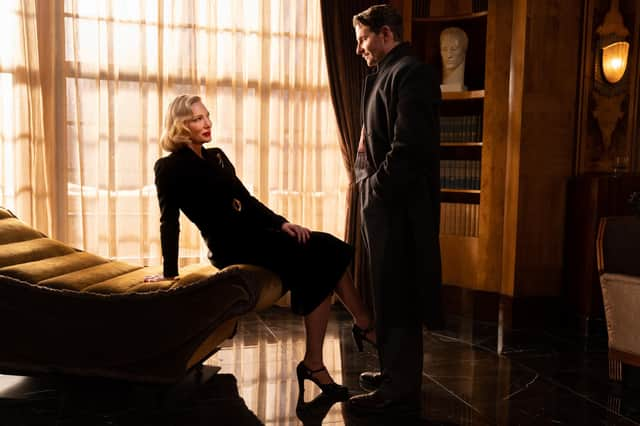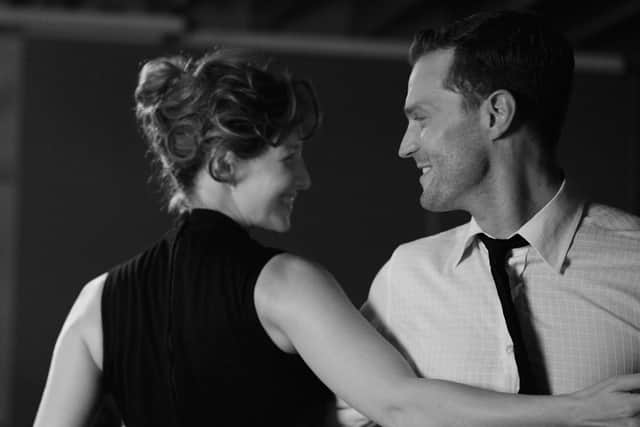Film reviews: Nightmare Alley | Belfast | Brian Wilson: Long Promised Road


Nightmare Alley (15) ****
Belfast (12A) ****
Brian Wilson: Long Promised Road (12A) ***
Nightmare Alley, the new Guillermo del Toro film, sees the Oscar-winning Mexican auteur delve into film noir with customary ghoulishness in a new adaptation of William Lindsay Gresham’s black-hearted 1946 novel about a carnival trickster negotiating the karmic cost of a deceitful life. Gresham’s book was previously the source for the 1947 classic starring Tyrone Power. The new film, which del Toro has co-written with film critic Kim Morgan, is set in the run-up to America’s entry into the Second World War and stars Bradley Cooper as Stanton Carlisle, a man whose desperation to outrun his past brings him into the freak-show fold of a travelling carnival, where his nascent talent for self-creation is fuelled by the mediums, illusionists and carnival barkers he witnesses duping audiences on a daily basis.
Here, del Toro doesn’t stint on depicting the exploitative, tragic side of this kind of marginal lifestyle. When he first stumbles across the carnival, Stanton witnesses a so-called “geek” show in all its chicken-crucifying wretchedness and del Toro’s natural affinity for monsters can’t help but make us empathise with the poor souls forced to perform in this way, especially when Stanton learns the truth about how they’re tricked into degrading themselves for the promise of a steady job. But as with the audience that pays to see the geek show, Stanton is only a rung or two above this kind of lowly existence and, in a country just coming out of the other side of the Great Depression, he creates a future for himself by taking what he’s learned and crafting a classier act that will allow him to put his skills to use fleecing wealthier patrons – something that brings him closer to Rooney Mara’s earnest carnival showgirl Molly, but also into the sphere of Cate Blanchett’s icy femme fatale, Lilith Ritter, a psychologist with a roster of well-to-do clients and a side-hustle of her own.
Advertisement
Hide AdWhat follows is an entertainingly noxious trawl through Stanton’s rise and fall as his life of deception eventually tips into a life of self-deception that leaves him ill-equipped to deal with the real horror lurking within the social elite he’s so desperate to conquer. Cooper is terrific in the lead, primarily because his movie-star aura effectively turns us into his marks – we don’t want to believe his character a bad man. It helps that del Toro knows just how to play us too. This is a film that may comment on its own creation by having characters discuss the ins and outs of misdirection, but del Toro wants to lure us into the story by making us part of it, not break its reality by flattering us into thinking we’re above it. To this end, his lavish visuals and prestige cast (among them Toni Colette, David Strathairn, Richard Jenkins and Willem Defoe) make it easy to get absorbed in the film’s world, yet he’s always ready to make us confront the bloody reality of this most cynical of genres. This is a noir in which the monsters can’t lurk in the shadows forever.
There’s something to be said for the way Kenneth Branagh’s semi-autobiographical drama Belfast manages to transform his boyhood experiences of the Troubles into such an ebullient coming-of-age drama. Mostly shot in shimmering black-and-white, the film plays out like a more upbeat Roma, Alfonso Cuarón’s elegiac tribute to his own otherwise idyllic childhood living on the fringes of civil unrest. In Branagh’s case, though, he doesn’t waste any time dropping us into the chaos.


Opening in the summer of 1969, the outbreak of sectarian violence arrives in heart-in-the-mouth fashion with a swirling camera shot showing the way a riot suddenly engulfs ten-year-old Branagh cipher Buddy (newcomer Jude Hill), a happy-go-lucky kid whose street becomes a target for Protestant extremists intent on driving Buddy’s Catholic neighbours out of their homes. Buddy’s family are themselves Protestant, but his principled father (Jamie Dornan) and long-suffering mother (Catrione Balfe) refuse to choose sides or tolerate hatred and so find themselves increasingly ostracised in their own neighbourhood.
Though the film probes some weighty themes, it’s at its best when capturing the resilience of its pint-sized protagonist, with Branagh keeping his camera low to replicate Buddy’s point-of-view and throwing in plenty nice touches, such as family trips to the pictures where the magic on the big screen unfolds in full colour, temporarily lifting everyone out of the grey reality of their own troubles.
The music industry doesn’t have a great track record of dealing with mental health issues, so kudos to Brian Wilson: Long Promised Road director Brent Wilson (no relation) for leading by example in this compassionate portrait of the creative genius behind the Beach Boys. Having interviewed him as a music journalist numerous times, he’s built up a lasting friendship with Wilson, who agrees to let him make a film about him so long as it consists of them just driving around Los Angeles talking.
The conversations that follow are tender, uncontrived and frequently moving and though the film is padded out with archival footage and hagiographic talking-head interviews, to hear the vulnerable Wilson reflect on the highs and lows of his life and music in a way that feels intimate without being exploitative makes it worthwhile.


All films in cinemas from 21 January
A message from the Editor:
Advertisement
Hide AdThank you for reading this article. We're more reliant on your support than ever as the shift in consumer habits brought about by coronavirus impacts our advertisers.
If you haven't already, please consider supporting our trusted, fact-checked journalism by taking out a digital subscription at https://www.scotsman.com/subscriptions